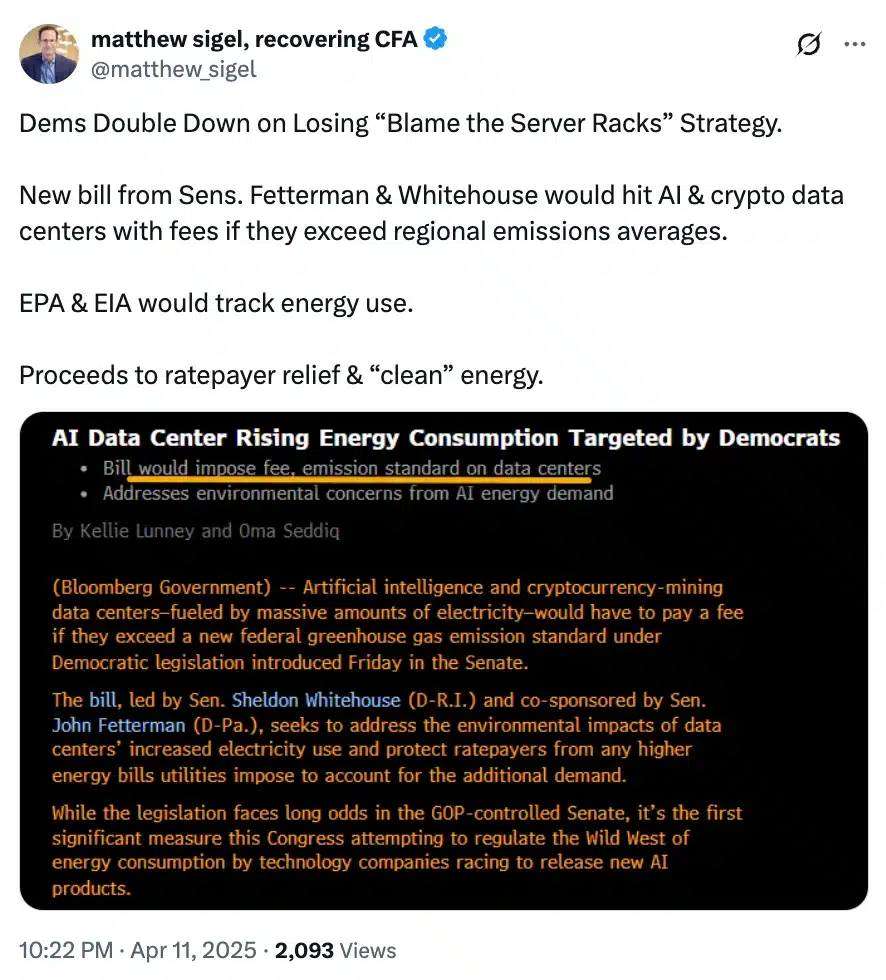- Clean Cloud Act proposes CO₂ fines for energy-intensive AI and crypto data centers
- Countries such as Pakistan use surplus electricity to stimulate Bitcoin -mining and AI infrastructure
American legislators have entered A concept drawing focused on the environmental and crypto operations environmental operations. With the title The Clean Cloud Act, the legislation is led by Senators Sheldon Whitehouse and John Fetterman.
The bill aims to control the rising energy requirements of data centers by enforcing stricter standards for carbon emissions.
What happens if the bill is accepted?
If adopted, the bill would enable the Environmental Protection Agency (EPA) to impose CO₂ fines on facilities that are larger than the federally set barriers.
Reasons for the same, senator fetterman said”
“Fighting to keep the United States cutting AI technology and to protect our natural resources for our children and grandchildren are not mutual exclusive goals.”
Following similar sentiments, Senator Whitehouse noted,
“Energy-hungry data centers and cryptomine facilities are overloading our already tense electricity grid, which increases the consumer’s electricity costs, making it more difficult for Americans to provide power to their homes and companies, and to stimulate the emissions of fossil fuels.”
Crypto community criticizes the bill – here is why
However, reactions were positive within the crypto community. Vaneck’s research leader Matthew Sigel, for example, believes that the account is unfair on Bitcoin [BTC] Miners for their energy consumption.
He said,

Source: Matthew Sigel/X
Further criticize the law, one X user added,
“This will probably not pass, but even if so, it is difficult to imagine that the administration will ever maintain it, except for a point -white order of the Supreme Court to do this.”
Challenges forward
While the Clean Cloud Act is waiting for the approval of the Senate, doubts continue to exist- slowly because of the exclusive democratic sponsorship. However, Trump’s earlier urge to the American dominance in AI and Crypto can keep the relevance of the bill very alive.
Yet the timing here is worth seeing. Especially since it seemed curious to be tailored to Bitcoin miners such as Galaxy and Terawulf who turned to AI-driven HPC services.
According to Coin statisticsMiner income saw signs of stabilization at the beginning of 2025. However, geopolitical tensions and continuous trade conflicts are still a threat to their fragile recovery.
What is more?
In fact, in the midst of rising equipment costs and imminent legal pressure in the US, the concerns about a possible decrease in the domestic demand for Bitcoin minimal installations are becoming.
Hashlabs -Minderbouw CEO Jaran Mellerud recently pointed out that this manufacturers could bring to load excess inventory to overseas markets. This may cause an increase in an increase in global mining activity.
Now that American miners are being confronted with increasing challenges, countries like Pakistan take the moment.
By making use of surplus electricity, Pakistan positions himself to feed both Bitcoin and the expansion of the AI data center, entirely in violation of what unfolds in the United States.

